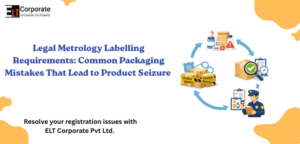With the rapid growth of online trade, ensuring compliance for digital businesses and e-commerce platforms has become a major concern for regulators, businesses, and consumers. Compliance means following all the laws, rules, and standards related to e-commerce, such as Legal Metrology, Consumer Protection, Data Privacy, and IT Rules. Without compliance, businesses may face penalties, lose customer trust, and struggle in the competitive market.
What Does Ensuring Compliance For Digital Businesses And E-Commerce Platforms Mean?
Ensuring compliance for digital businesses and e-commerce platforms means following all the legal, technical, and regulatory requirements set by the government. It ensures that:
- Products sold online display accurate weights, prices, and descriptions.
- Consumer rights are protected from fraud and misleading claims.
- Personal data collected online is stored safely and used responsibly.
- Business operations are transparent and fair.
Why Is Ensuring Compliance For Digital Businesses And E-Commerce Platforms Important?
Compliance is important because it protects both consumers and businesses. Key reasons include:
- Consumer safety – Prevents false advertising and ensures correct product information.
- Legal protection – Businesses avoid heavy fines or legal action.
- Trust building – Customers are more likely to buy from compliant platforms.
- Smooth operations – Ensures faster approvals and less regulatory interruption.
Which Authorities Regulate Ensuring Compliance For Digital Businesses And E-Commerce Platforms In India?
Several authorities regulate compliance in India, such as:
- Ministry of Consumer Affairs – Implements Legal Metrology Rules for e-commerce labeling.
- FSSAI (Food Safety and Standards Authority of India) – Regulates food items sold online.
- MeitY (Ministry of Electronics & IT) – Oversees data protection and IT rules.
- DGFT (Directorate General of Foreign Trade) – Regulates import/export policies.
- CDSCO (Central Drugs Standard Control Organization) – Monitors sale of medical devices online.
- State Consumer Protection Authorities – Handle consumer complaints.
What Are The Key Legal Requirements In Ensuring Compliance For Digital Businesses And E-Commerce Platforms?
Some key requirements are:
- Display of MRP, weight, expiry date, and manufacturer details on online platforms.
- Following Consumer Protection (E-commerce) Rules, 2020.
- Data handling as per IT Act and upcoming Data Protection Act.
- Licensing for restricted categories like food, cosmetics, or medical devices.
- Fair trade practices – No hidden charges or fake reviews.
How Do Data Protection Laws Affect Ensuring Compliance For Digital Businesses And E-Commerce Platforms?
Data protection laws ensure that user data is secure and not misused. For compliance:
- Businesses must collect only necessary data.
- They must inform users how data will be used.
- Personal information should be stored with encryption.
- Sharing of data with third parties without permission is restricted.
This builds consumer trust and avoids penalties under privacy laws.
What Role Does Legal Metrology Play In Ensuring Compliance For Digital Businesses And E-Commerce Platforms?
Legal Metrology ensures accuracy in weights, measures, and labeling. For e-commerce platforms:
- Every product listing must have MRP, weight/volume, expiry date, and origin.
- Sellers cannot manipulate prices or use misleading measurements.
- Ensures uniform labeling for both offline and online markets.
How Does Consumer Protection Law Support Ensuring Compliance For Digital Businesses And E-Commerce Platforms?
The Consumer Protection Act, 2019 and E-commerce Rules, 2020 safeguard buyers by:
- Preventing unfair trade practices like fake reviews or hidden costs.
- Making platforms liable for defective products sold online.
- Ensuring easy returns and refunds.
- Providing a system for complaints and dispute resolution.
What Are The Common Challenges In Ensuring Compliance For Digital Businesses And E-Commerce Platforms?
Some challenges businesses face include:
- Multiple laws applying at the same time (Legal Metrology, FSSAI, IT Act).
- Constantly changing rules in digital trade.
- Data privacy risks due to cyber threats.
- Cross-border regulations for foreign sellers.
- High compliance costs for small businesses.
How Can Technology And Ai Help In Ensuring Compliance For Digital Businesses And E-Commerce Platforms?
AI and technology make compliance easier by:
- Automating labeling checks for accuracy.
- Monitoring fake reviews and frauds.
- Tracking regulatory updates in real time.
- Detecting cybersecurity threats to protect user data.
- Reducing manual errors in reporting and documentation.
Why Is Professional Consultancy Important For Ensuring Compliance For Digital Businesses And E-Commerce Platforms?
Professional consultancy helps businesses handle complex compliance requirements. Benefits include:
- Expert guidance on Legal Metrology, FSSAI, IT, and Consumer Protection laws.
- Preparation and verification of documents, licenses, and registrations.
- Faster approvals by avoiding errors.
- Risk management against penalties.
- End-to-end support for local and foreign businesses entering India’s e-commerce market.
Conclusion
Ensuring compliance for digital businesses and e-commerce platforms is not just a legal requirement but also a way to build trust, protect consumers, and grow sustainably. With rising regulations in India and globally, businesses must adopt technology and expert consultancy to stay compliant and competitive.
What Happens If An E-Commerce Platform Does Not Follow Compliance Rules?
It may face penalties, product bans, or even suspension of its operations.
How Can Small Businesses Maintain Compliance In E-Commerce?
By following labeling rules, using licensed software, and taking professional consultancy support.








